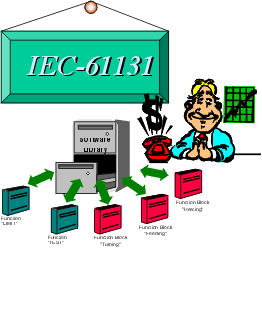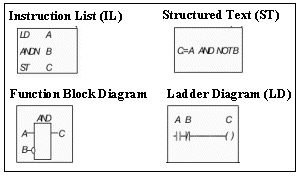|
IEC 1131-3: a standard programming resource

Introduction
Programming Languages
Conclusions
Interesting Liks
Introduction
IEC 1131-3 is the first real endeavour to standardize programming
languages for industrial automation. With its world wide support,
it is independent of any single company. IEC 1131-3 is the third
part of the IEC 1131 family. This consists of:
- Part 1: General Overview
- Part 2 Hardware
- Part 3 Porgramming Languages
- Part 4 User Guidelines
- Part 5 Communication
Programming Languages
Within the standard four programming languages are defined. This
means that their syntax and semantics have been defined, leaving
no room for dialects. Once you have learned them, you can use
a wide variety of systems based on this standard. The languages
consist of two textual and two graphical versions:
Textual:
- Instruction List, IL
- Structured Text, ST
Graphical:
- Ladder Diagram, LD
- Function Block Diagram, FBD

Conclusions
The technical implications of the IEC 1131-3 standard are high,
leaving enough room for growth and differentiation. This makes
this standard suitable to evolve well into the next century. IEC
1131-3 will have a great impact on the whole industrial control
industry. It certainly will not restrict itself to the conventional
PLC market. Nowadays, one sees it adopted in the motion control
market, distributed systems and softlogic / PC based control systems,
including SCADA packages. And the areas are still growing. Having
a standard over such a broad application area, brings numerous
benefits for users / programmers. The benefits for adopting this
standard are various, depending on the application areas. Just
to name a few for the mindsetting:
1- Reduced waste of human resources, in training, debugging, maintenance
and consultancy
2- Creating a focus to problem solving via a high level of software
reusability
3- Reduced misunderstanding and errors
4- Programming techniques usable in a broad environment: general
industrial control
5- Combining different components from different programs, projects,
locations, companies and/or countries departamentos y compañías.
Interesting Links
www.plcopen.org.
|







